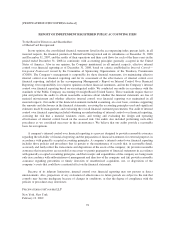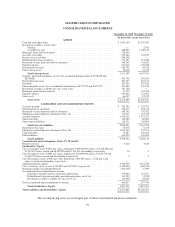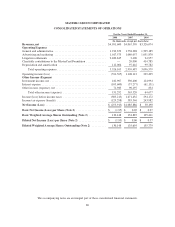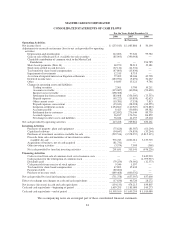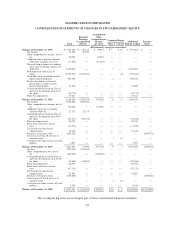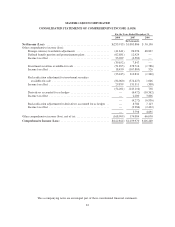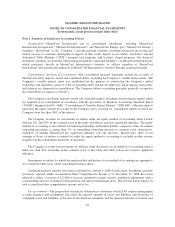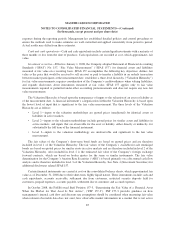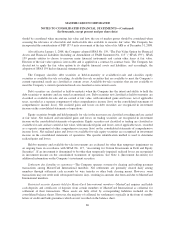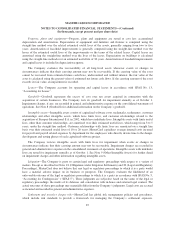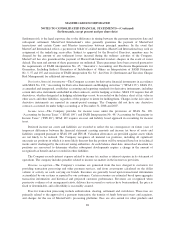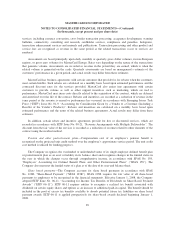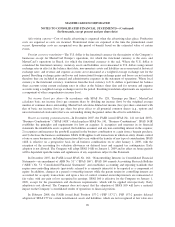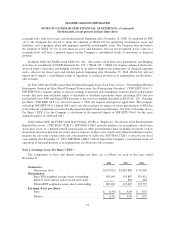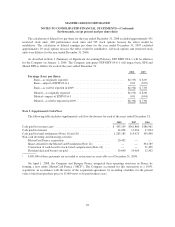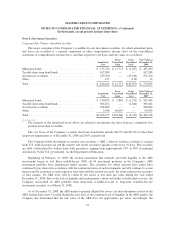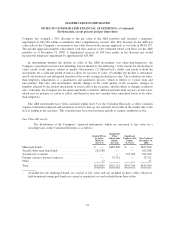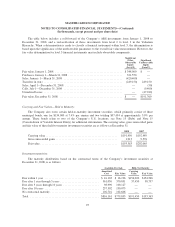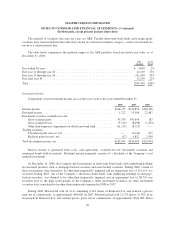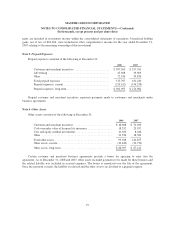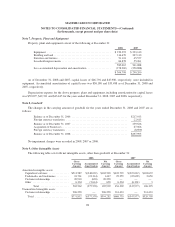MasterCard 2008 Annual Report Download - page 98
Download and view the complete annual report
Please find page 98 of the 2008 MasterCard annual report below. You can navigate through the pages in the report by either clicking on the pages listed below, or by using the keyword search tool below to find specific information within the annual report.MASTERCARD INCORPORATED
NOTES TO CONSOLIDATED FINANCIAL STATEMENTS—(Continued)
(In thousands, except percent and per share data)
Settlement risk is the legal exposure due to the difference in timing between the payment transaction date and
subsequent settlement. MasterCard International’s rules generally guarantee the payment of MasterCard
transactions and certain Cirrus and Maestro transactions between principal members. In the event that
MasterCard International effects a payment on behalf of a failed member, MasterCard International may seek an
assignment of the underlying receivables. Subject to approval by the Board of Directors, members may be
charged for the amount of any settlement losses incurred during the ordinary activities of the Company.
MasterCard has also guaranteed the payment of MasterCard-branded travelers cheques in the event of issuer
default. The term and amount of these guarantees are unlimited. These guarantees have been assessed pursuant to
the requirements of FASB interpretation No. 45, “Guarantor’s Accounting and Disclosure Requirements for
Guarantees, Including Indirect Guarantees of Indebtedness of Others an Interpretation of FASB Statements
No. 5, 57 and 107 and rescission of FASB interpretation No. 34”. See Note 21 (Settlement and Travelers Cheque
Risk Management) for additional information.
Derivative financial instruments—The Company accounts for derivative financial instruments in accordance
with SFAS No. 133, “Accounting for Derivative Instruments and Hedging Activities” (“SFAS 133”). SFAS 133,
as amended and interpreted, establishes accounting and reporting standards for derivative instruments, including
certain derivative instruments embedded in other contracts, and for hedging activities. SFAS 133 requires that all
derivatives, whether designated in hedging relationships or not, be recorded on the balance sheet at fair value in
other assets and other liabilities, regardless of the purpose or intent for holding them. Changes in the fair value of
derivative instruments are reported in current-period earnings. The Company did not have any derivative
contracts accounted for under hedge accounting as of December 31, 2008 and 2007.
Income taxes—The Company provides for income taxes under the provisions of SFAS No. 109,
“Accounting for Income Taxes” (“SFAS 109”) and FASB Interpretation No. 48 “Accounting for Uncertainty in
Income Taxes” (“FIN 48”). SFAS 109 requires an asset and liability based approach in accounting for income
taxes.
Deferred income tax assets and liabilities are recorded to reflect the tax consequences on future years of
temporary differences between the financial statement carrying amounts and income tax bases of assets and
liabilities computed pursuant to SFAS 109 and FIN 48. Valuation allowances are provided against assets which
are not likely to be realized. The Company recognizes all material tax positions, including all significant
uncertain tax positions in which it is more likely than not that the position will be sustained based on its technical
merits and if challenged by the relevant taxing authorities. At each balance sheet date, unresolved uncertain tax
positions are reassessed to determine whether subsequent developments require a change in the amount of
recognized tax benefit and are recorded in other liabilities.
The Company records interest expense related to income tax matters as interest expense in its statement of
operations. The company includes penalties related to income tax matters in the income tax provision.
Revenue recognition—The Company’s revenues are generated from the fees charged to customers for
providing transaction processing and other payment services, and from assessments calculated on the dollar
volume of activity on cards carrying our brands. Revenues are generally based upon transactional information
accumulated by our systems or reported by our customers. Certain revenues are estimated based upon aggregate
transaction information and historical and projected customer performance. Revenues are recognized when
persuasive evidence of an arrangement exists, delivery has occurred or services have been rendered, the price is
fixed or determinable, and collectibility is reasonably assured.
Fees for transaction processing include authorization, clearing, settlement and switch fees. These fees are
primarily related to the approval of a payment transaction, the transfer of funds between issuers and acquirers,
and charges for the use of MasterCard’s processing platforms. Fees are also earned for other products and
88


